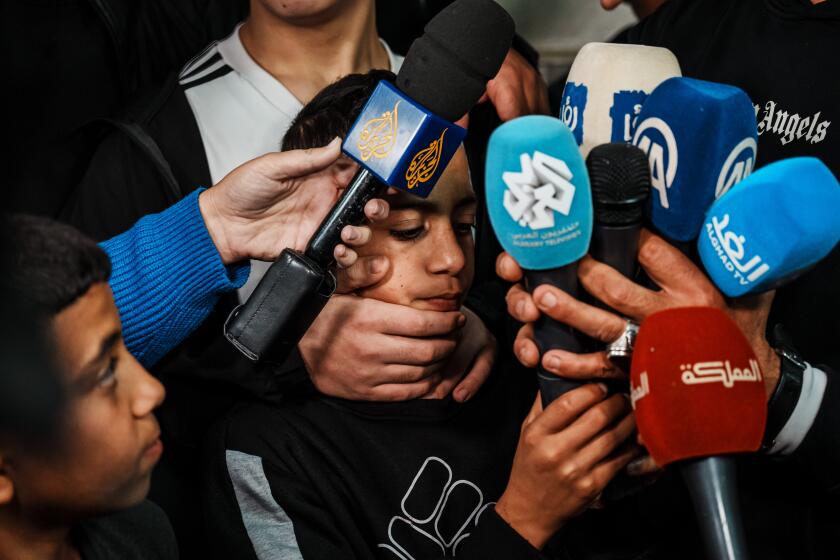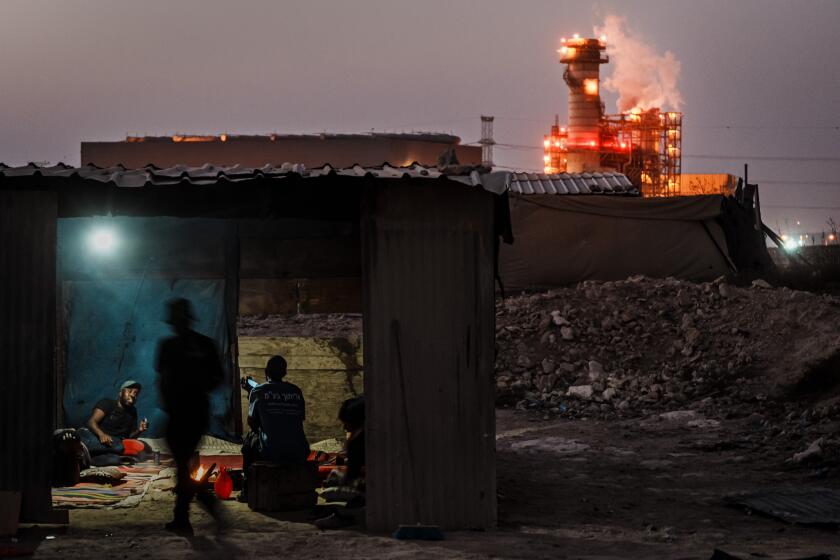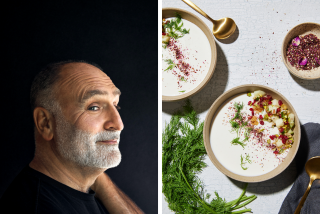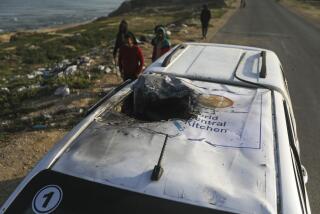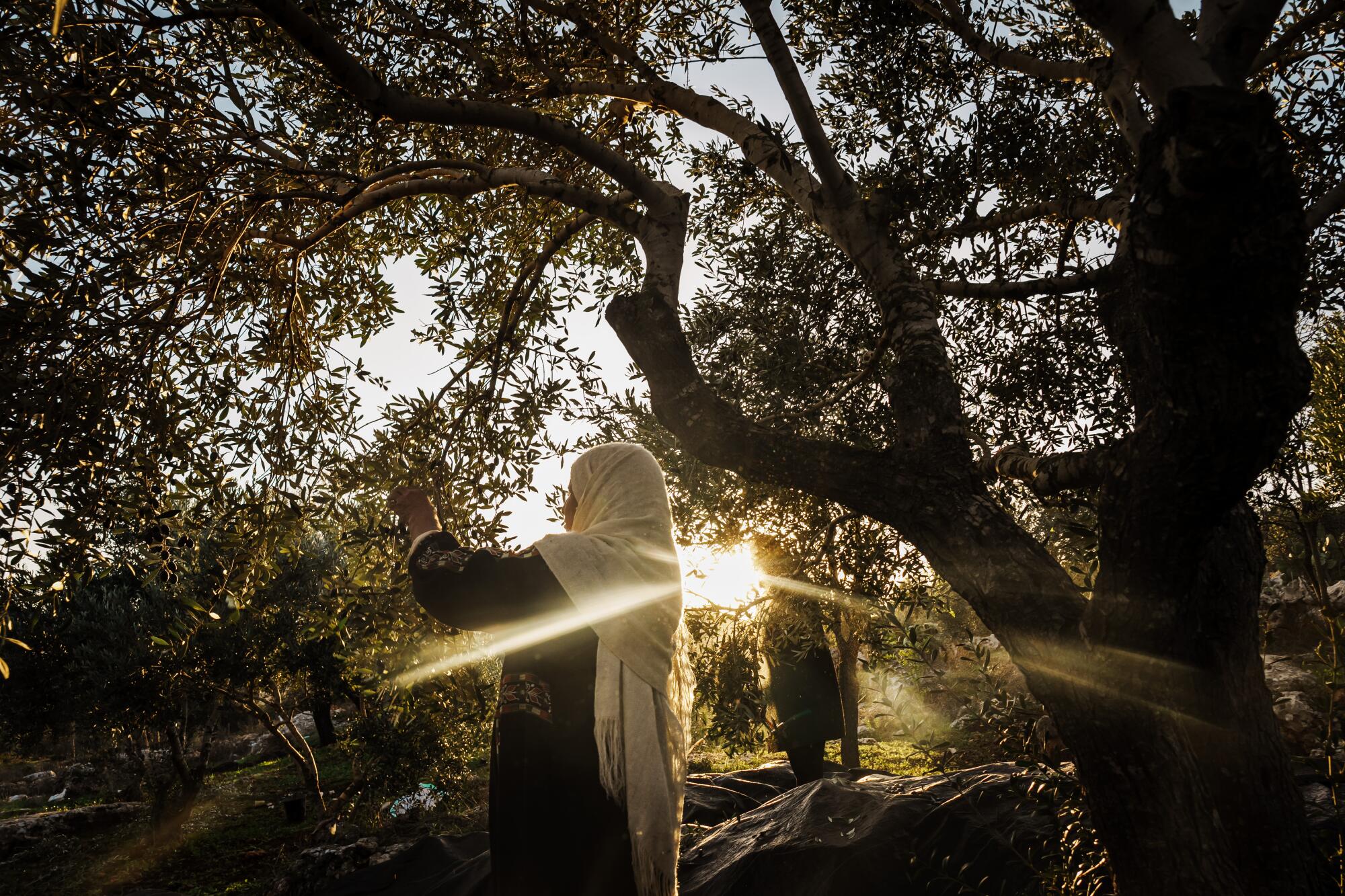
Abdullah abu Awad first harvested his family’s olive grove decades ago with his father and grandfather. He knows the trees as well as he knows his own children.
But he hesitated before driving across the field one morning in December, unsure what the nearby Israeli settlers might do. The settlement of Shiloh sits just beyond the fence of his 12-acre property.
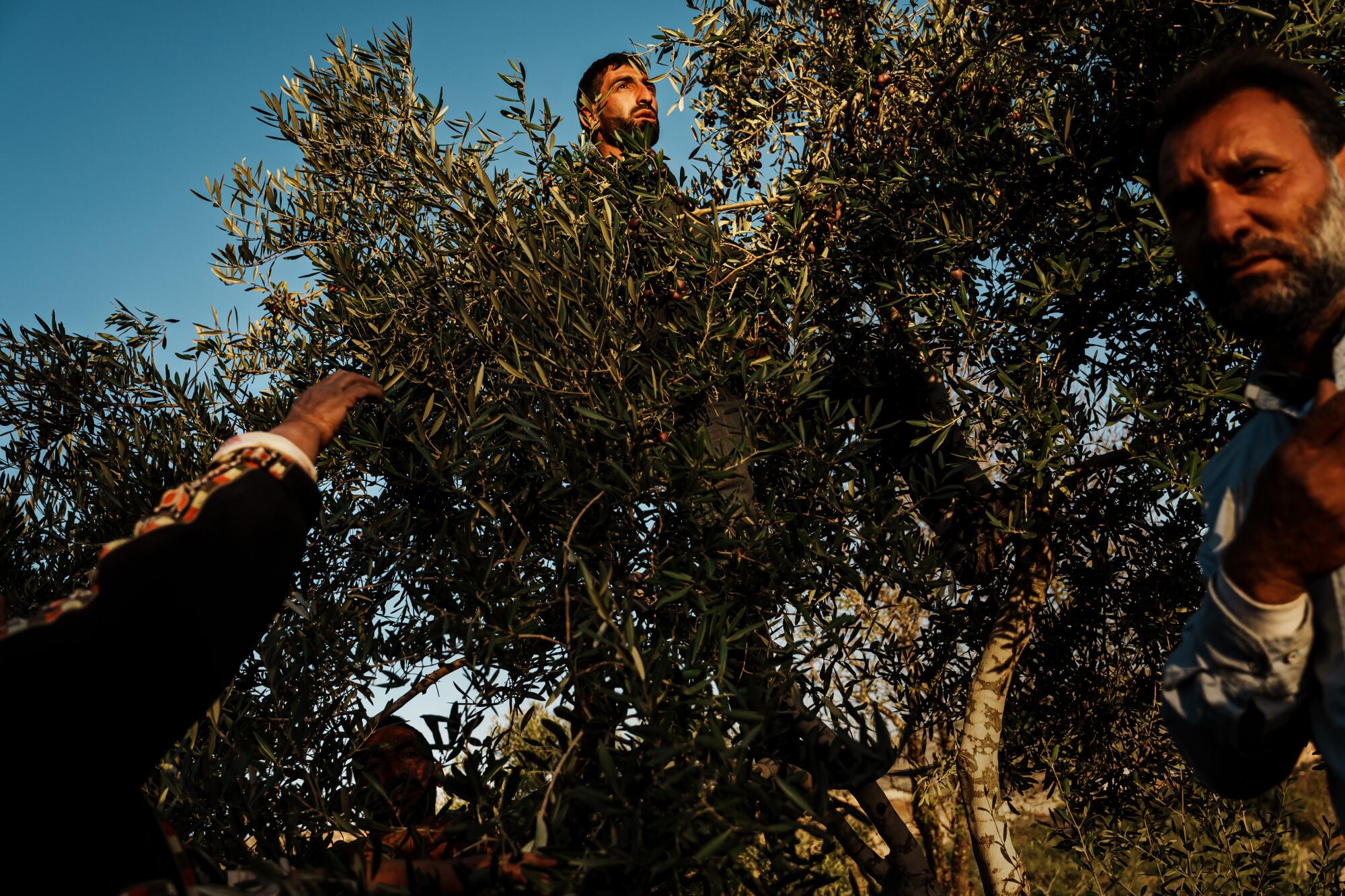
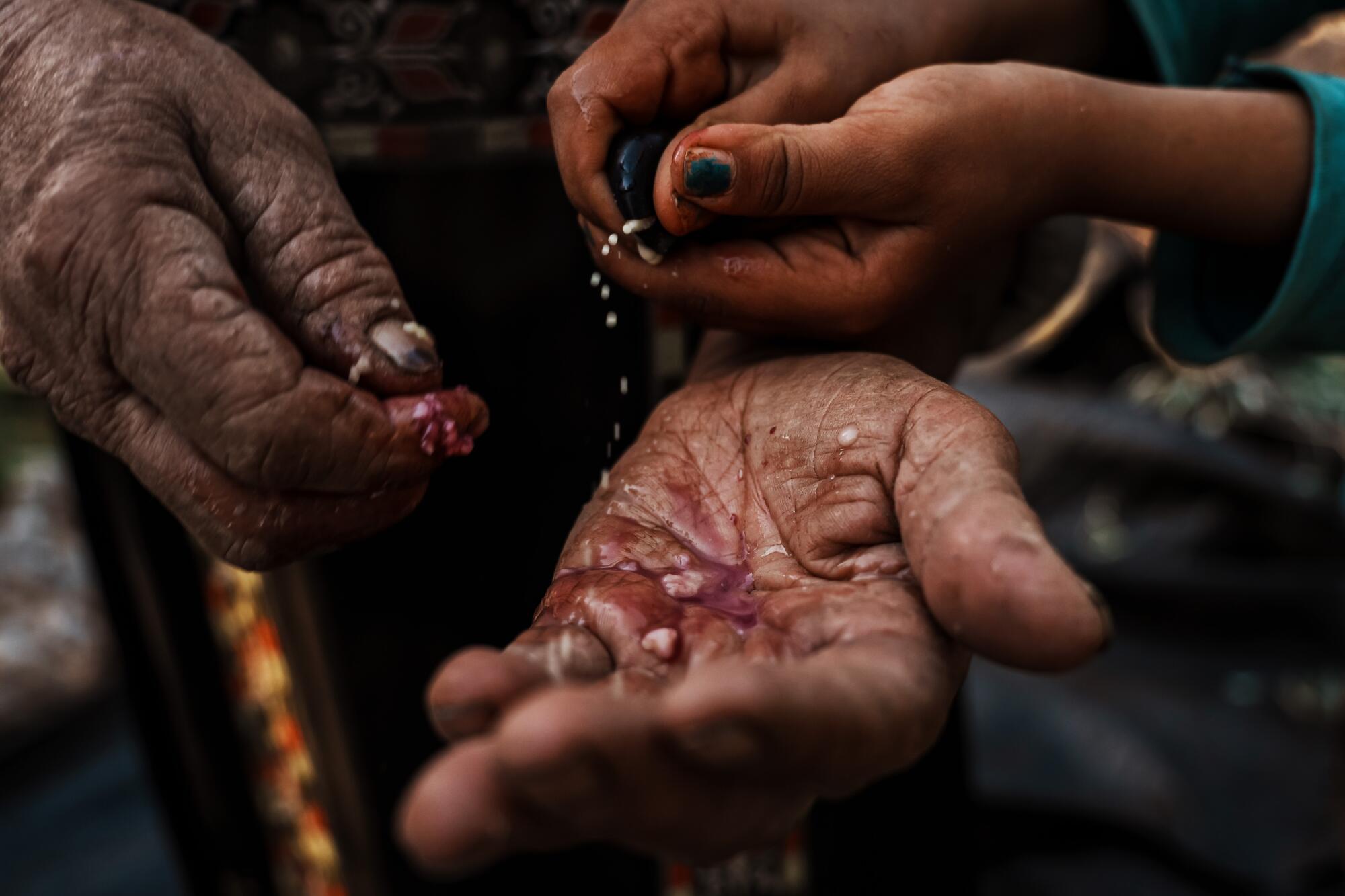
“Do you see anyone coming?” the 45-year-old farmer asked his son, who sat beside him in their SUV, scanning the road ahead.
“It seems OK,” replied Judeh, 25, his voice tense.
They proceeded into the olive grove. The plan for that early December day was to harvest olives — an annual job that expanding Israeli settlements have made increasingly difficult over the years for the more than 100,000 Palestinian families in the West Bank who rely on the crop for their livelihood.
Since the start of the war in the Gaza Strip in October, collecting olives had turned dangerous. Abu Awad and his family say they have been beaten up and repeatedly threatened with expulsion from their land. Their house has been vandalized, and some of their farm equipment has been confiscated or destroyed.
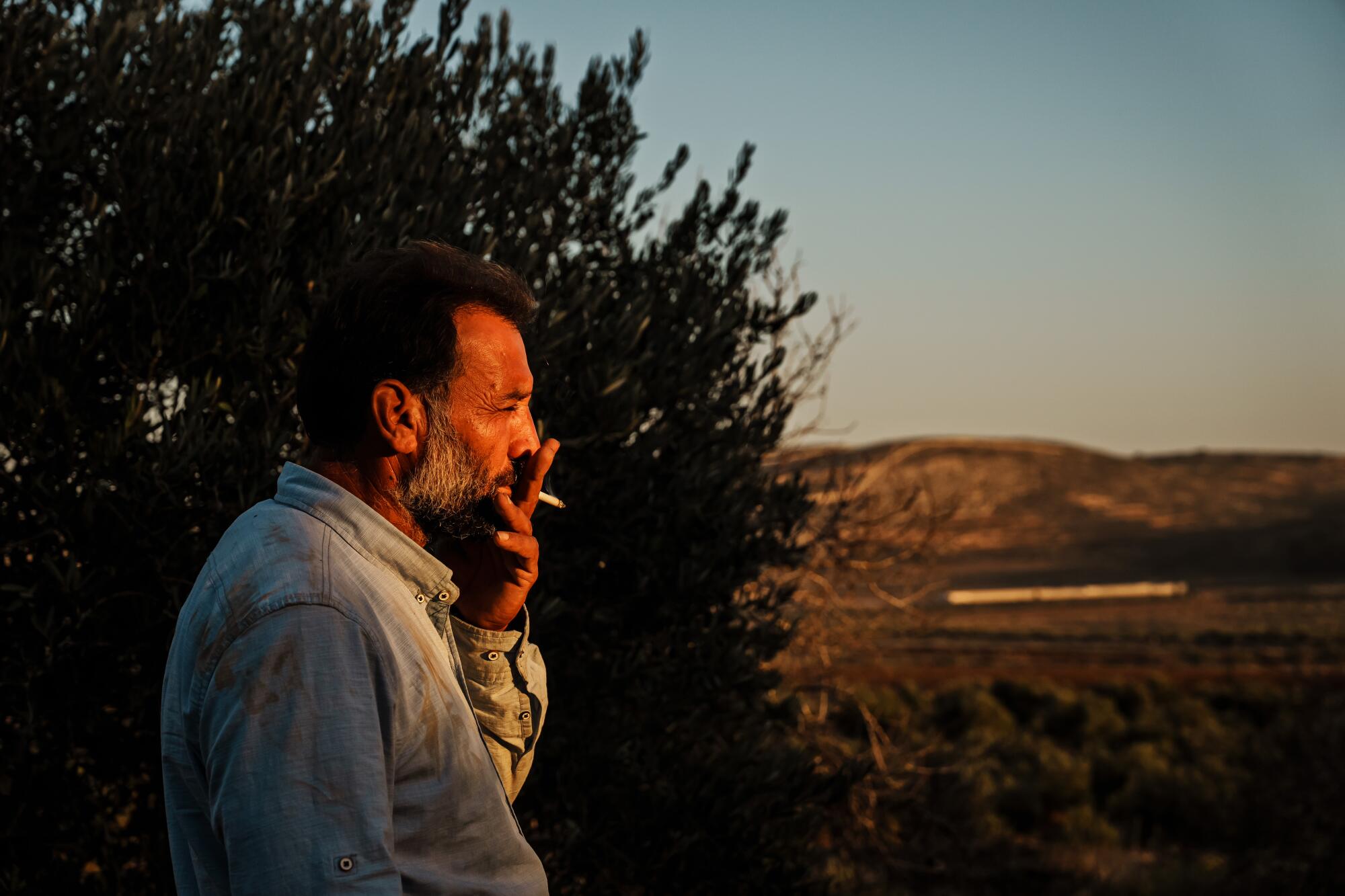
Farmers throughout the region worry that their way of life may be on the verge of extinction — as settlers and Israeli forces use the war as a pretext to shut them down.
“The last season, they allowed us to get only a part of this grove,” Abu Awad explained. “This time it’s even less.”
“I don’t know why they won’t let us harvest,” he continued, pointing to the trees laden with plump fruit. “Look, it’s a sea of olives.”
: :
In the old days, Abu Awad found joy in the olive harvest, which starts in October and ends in early December.
Neighbors and extended families would come together to work the groves covering these hills a dozen miles north of Ramallah.
The local olive press became a hangout spot, with farmers bringing their haul and dunking flatbread in the stream of fresh olive oil.
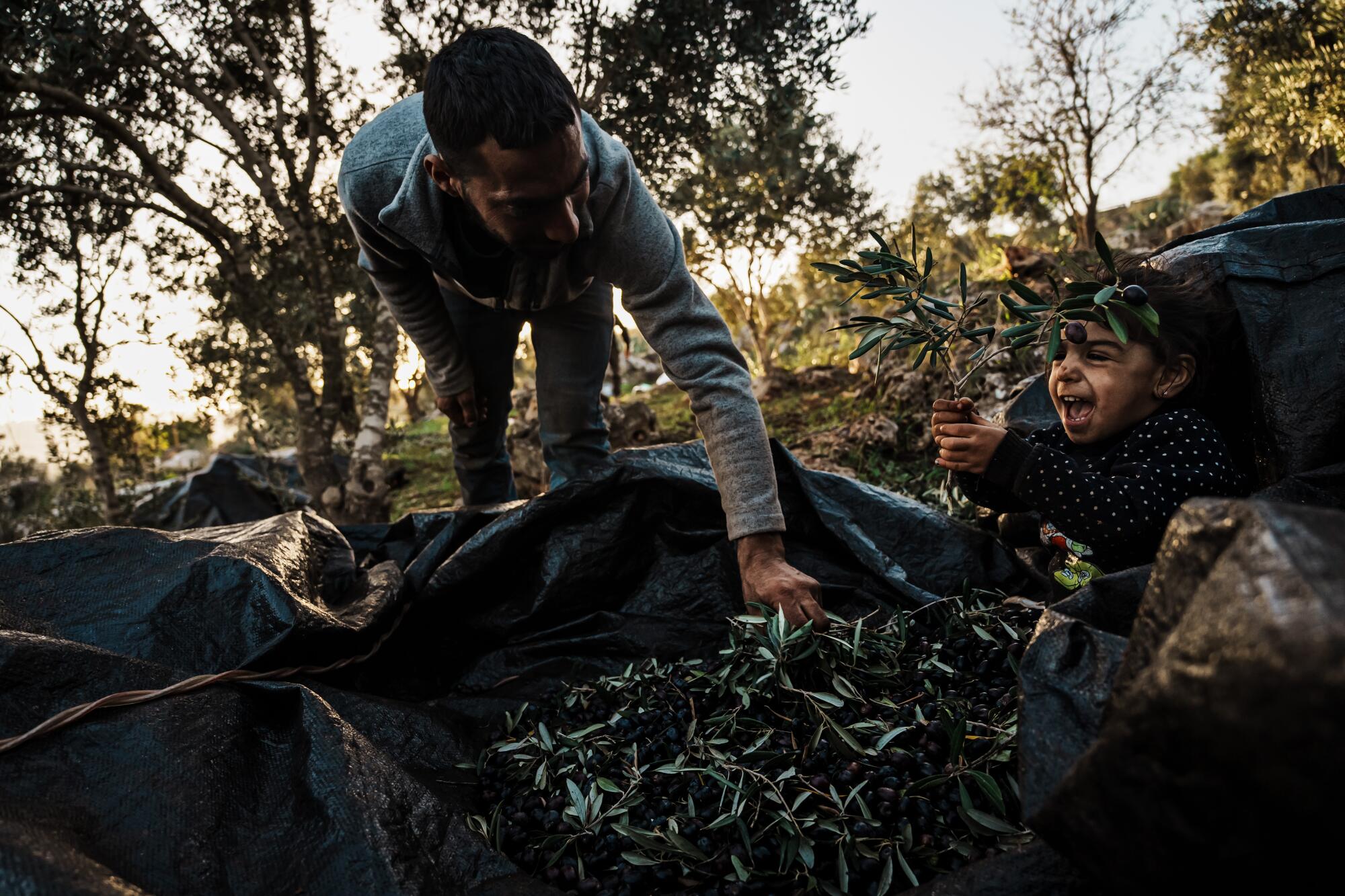
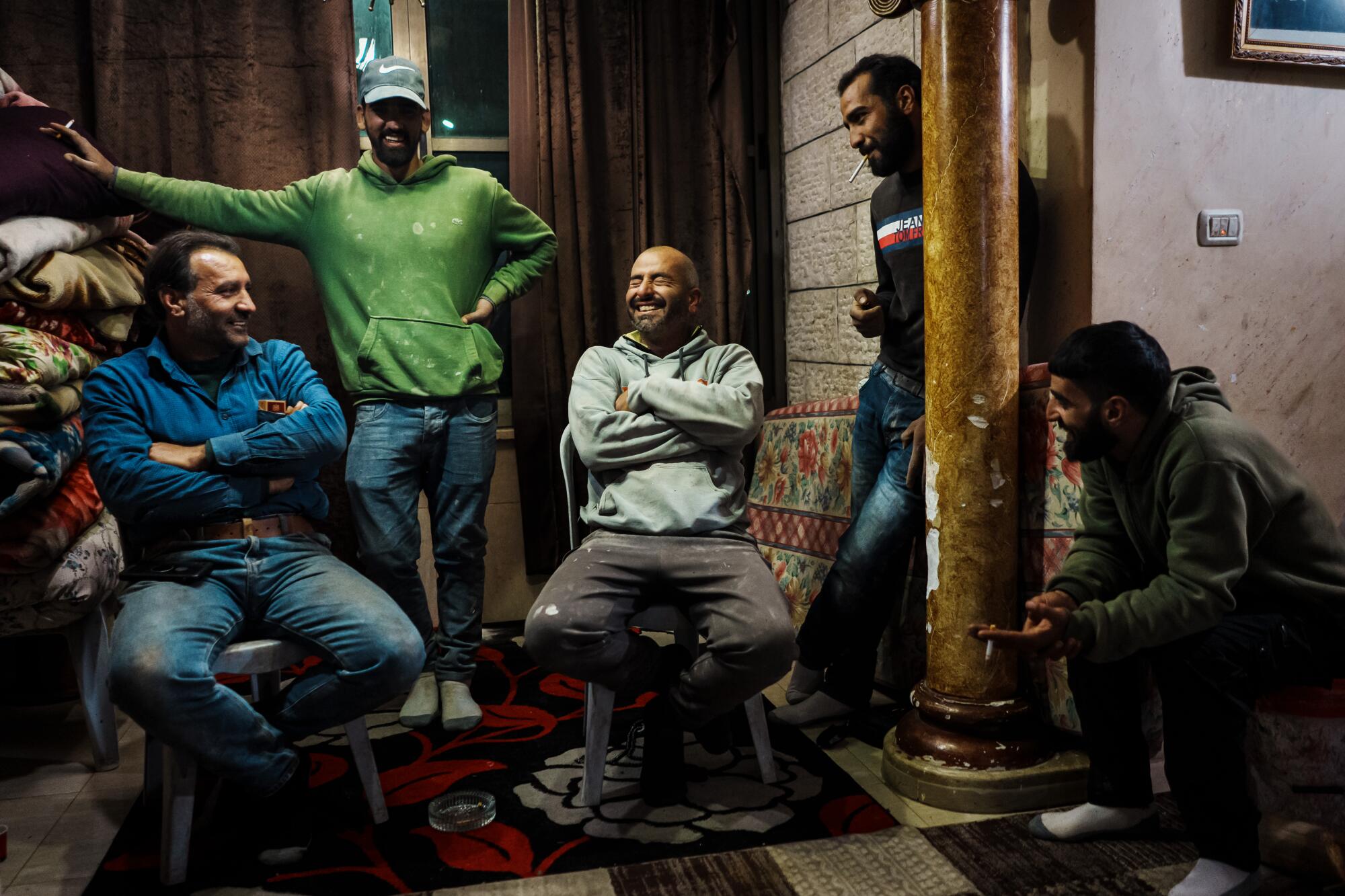
But the joy has slowly been replaced by anxiety as the Israeli settlements expanded and the settlers grew more aggressive toward their Palestinian neighbors.
In 2005, Israel instituted a system in which most Palestinians wanting to access their land had to coordinate with the occupying country’s military for protection from settlers. Farmers had no choice but to limit harvesting to as few as three days a year. In 2006, when settlers commandeered roads for their exclusive use, Turmus Ayya residents had to take ever-longer detours to get home.
The recent hostage-for-prisoner swaps between Hamas and Israel have focused attention on the number of Palestinian minors imprisoned by Israel.
Turmus Ayya and many surrounding villages were supposed to be part of an eventual Palestinian state under the 1993-95 Oslo peace accords. Instead, each year since then, settlements have swallowed up more acres of the Palestinian territory.
The land grab has gone into overdrive since Oct. 7, when Hamas militants invaded southern Israel and — according to the Israeli government — killed more than 1,160 people and kidnapped some 240.
The next day, the Israeli army set up a checkpoint on the road leading to Abu Awad’s land. Settlers soon installed a camera on a watchtower on the edge of Shiloh, about 60 feet from his home.
In the weeks before Oct. 7, Abu Awad had been planning to work on his house, which was badly damaged in a storm. But Israeli forces barred him from bringing in workers or cement mixers he needed for the job. One officer made him produce the title deeds to his land and home.
Then one morning in early December, a settler showed up at his house and told his wife, Shahla, that they should leave and never return.
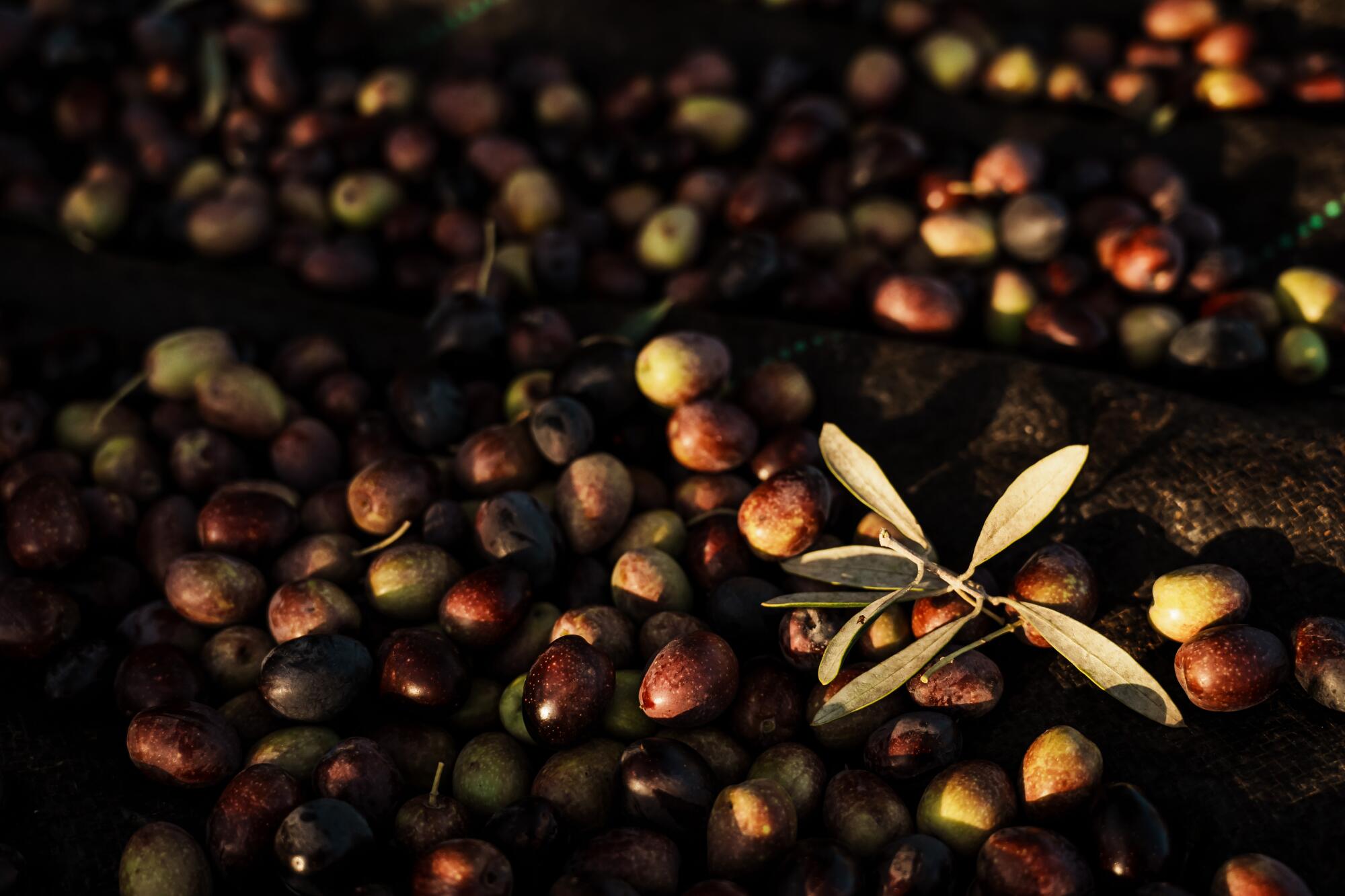
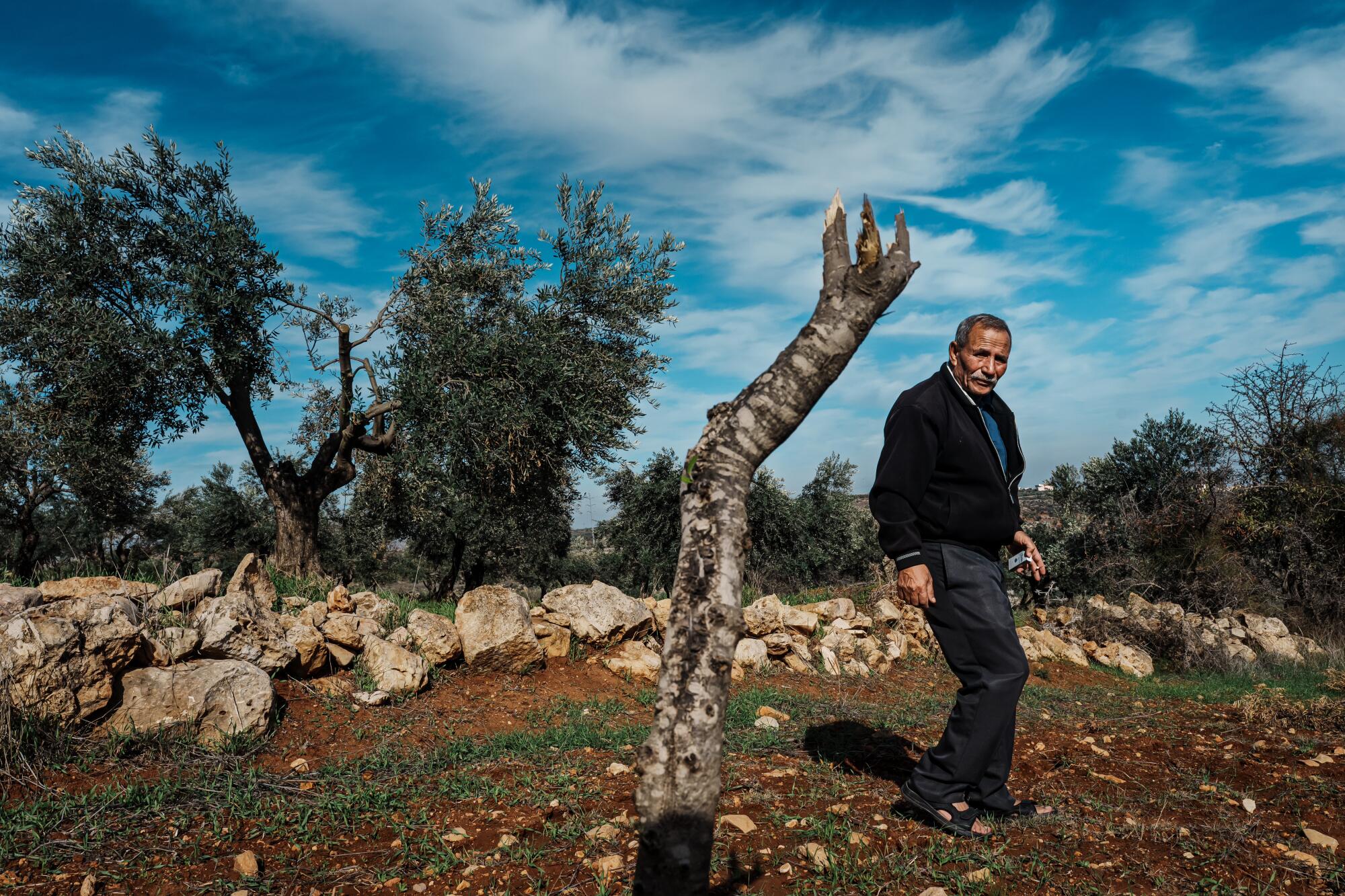
“Provocations, restrictions,” Abu Awad said, recounting the incident as he spread tarps and burlap sacks under his olive trees. “They try to make you lose money, to destroy you in every way — they’re doing all they can to make us leave.”
His mother, wife, sister and sons thwacked the trees with sticks and rakes. As olives rained down, his grandchildren picked them up and began filling the sacks.
Abu Awad admonished his family to work quietly so as not to attract attention.
“It’s like we’re stealing our own olives,” his wife said. “We have to work in secret or the settlers will come.”
Barely half an hour later, the family was packing up, not willing to risk spending more time in their grove. They had managed to collect a few bags of olives.
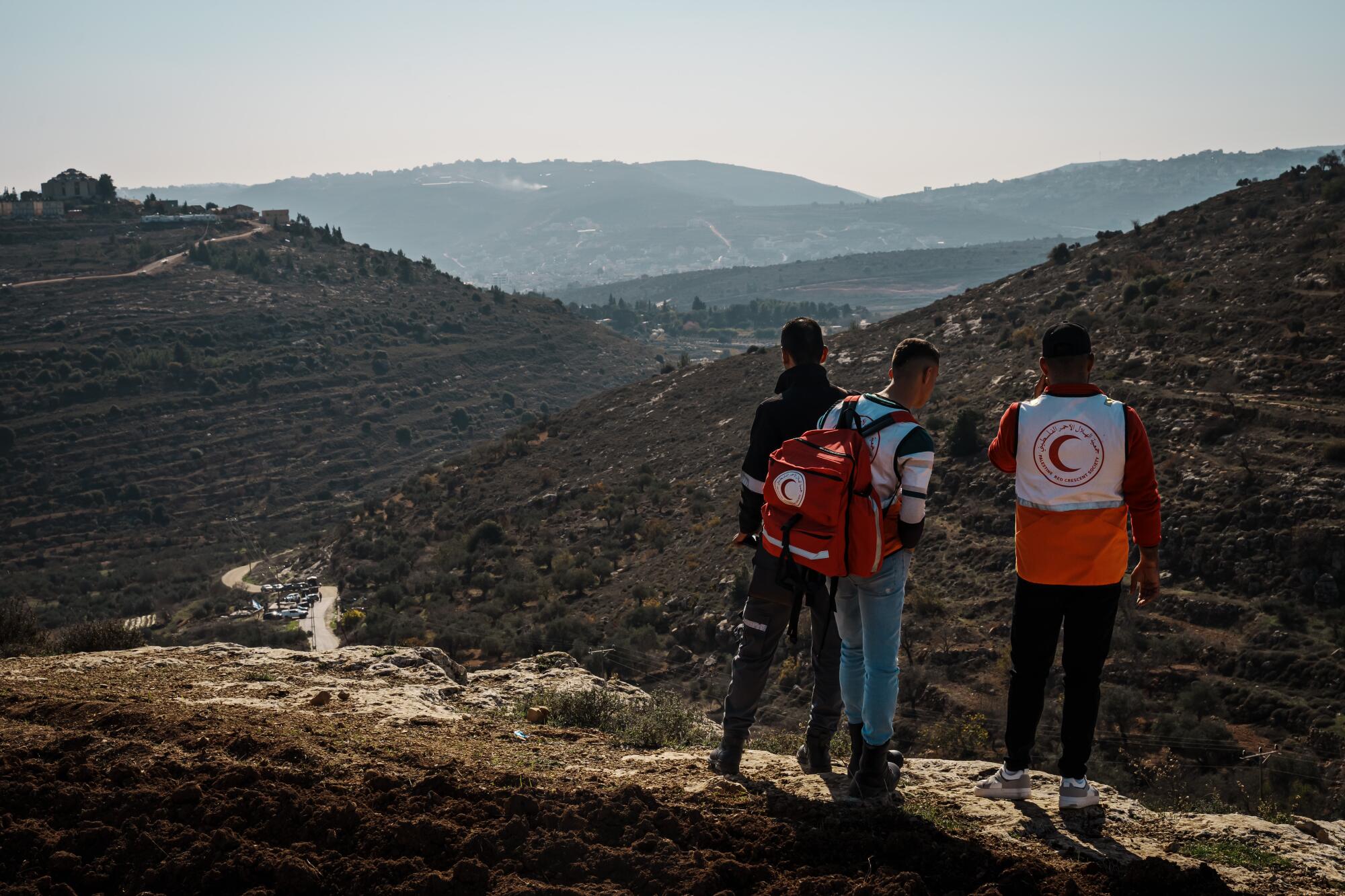
Their experience is part of a wider pattern documented by rights groups, which report that Israeli settlers — often armed and in uniform as military reservists — have set up roadblocks to keep Palestinian farmers off their own land; have confiscated their equipment; and have detained and beaten up agricultural workers.
Settlers are also accused of burning, breaking or uprooting thousands of olive trees. In some instances, they simply harvested the olives for themselves. An estimated 9,850 trees or saplings have been damaged in hundreds of attacks by settlers since the war began, according to the United Nations Office for the Coordination of Humanitarian Affairs.
These observers describe the aggression as a land grab aimed at expanding settlements, which are considered illegal under international law.
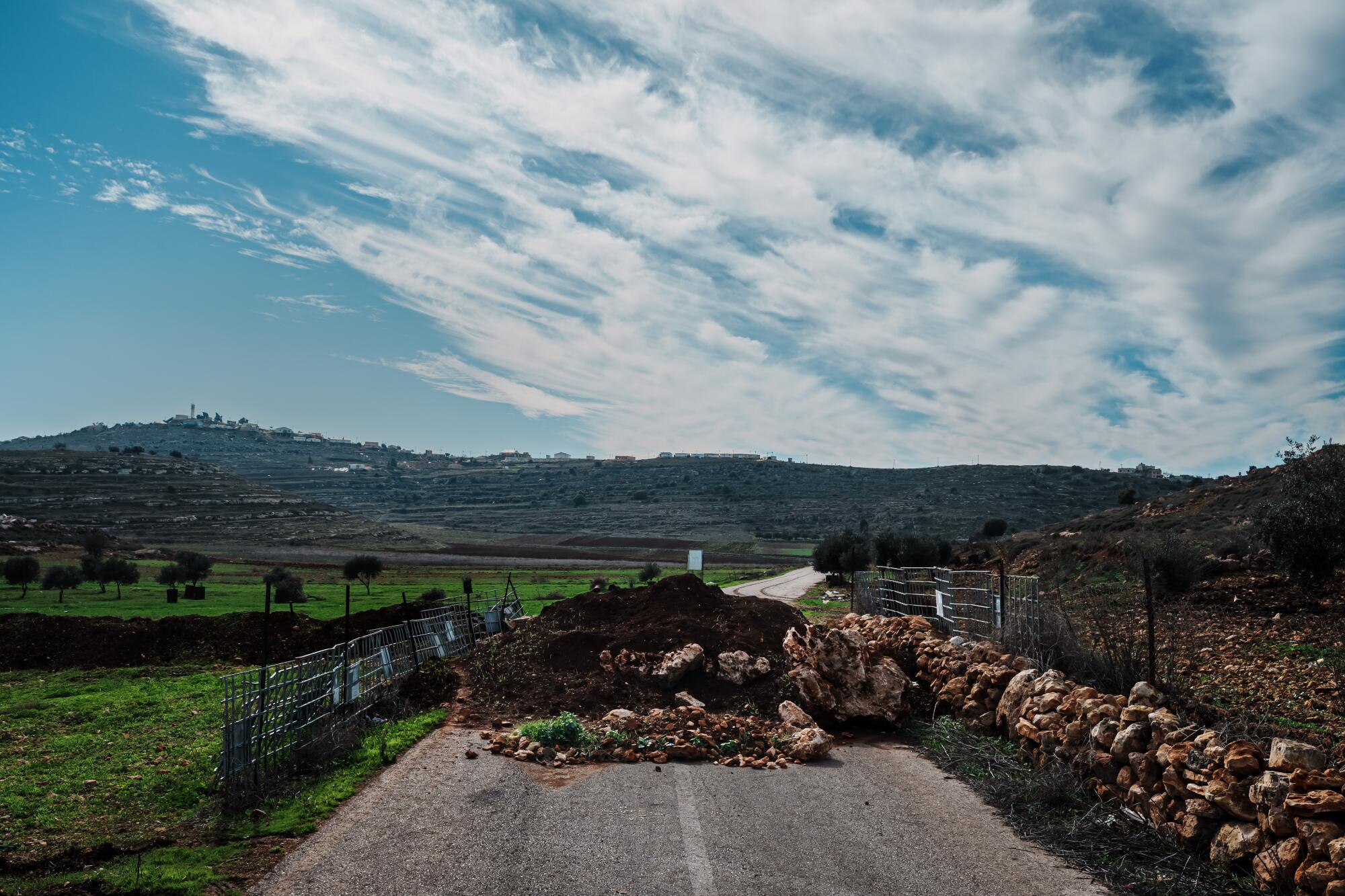
In that time, at least 434 Palestinians in the West Bank — a quarter of them children — have been killed by soldiers and settlers, Palestinian authorities say. On the Israeli side, the death toll in the occupied territory is 15, including four security personnel, according to Israel’s official tally.
In a statement sent to The Times on WhatsApp, a spokesman for the Mateh Binyamin Regional Council — which represents Shiloh and 45 other Jewish settlements and outposts in the West Bank — said the restrictions imposed on Abu Awad and his family in recent months were part of heightened security protocols put in place by the Israeli military after Oct. 7.
“Both illegal Arab construction and olive harvesting in the vicinity of the Jewish settlements constitute a serious security danger that threatens the lives of Jewish families, women and children,” the statement said.
“Almost every day, there are incidents of violence by the Arabs of the region against Israelis including women and children,” the statement continued, adding that Abu Awad and his family “must coordinate with the security forces” when moving “in the areas near the Jewish settlements.”
1
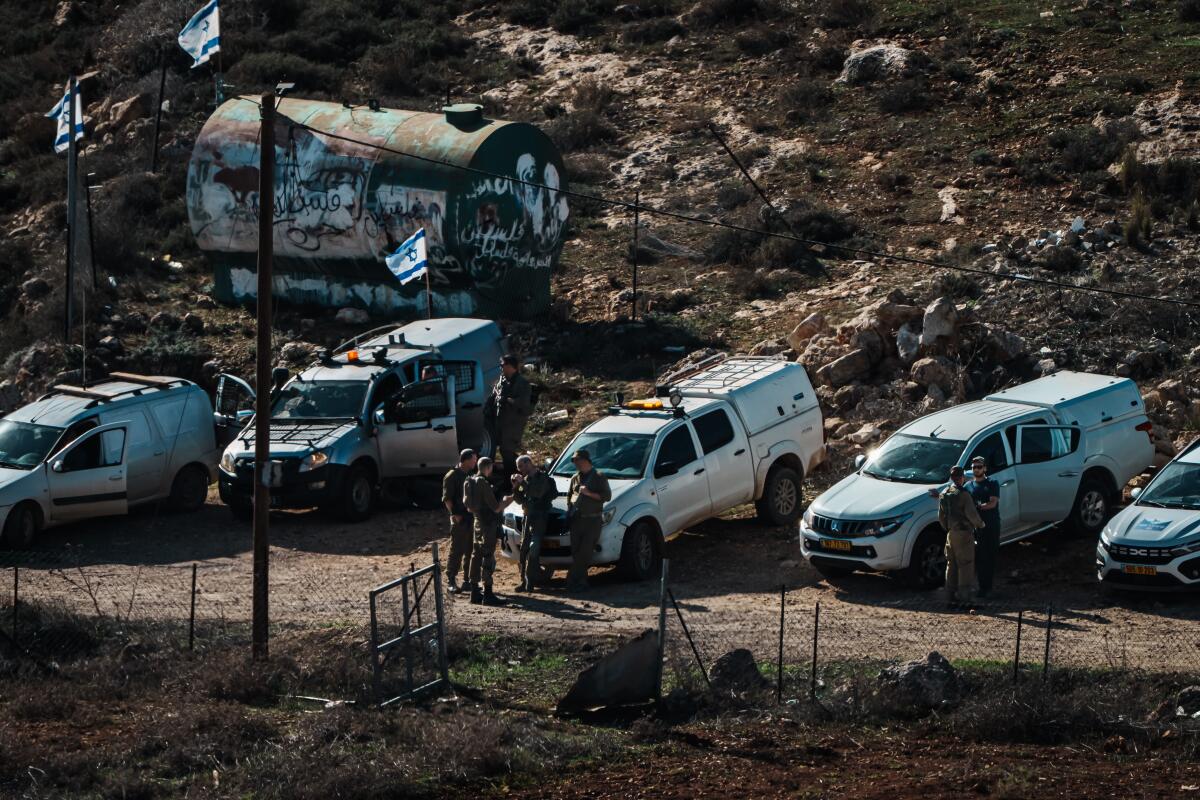
2
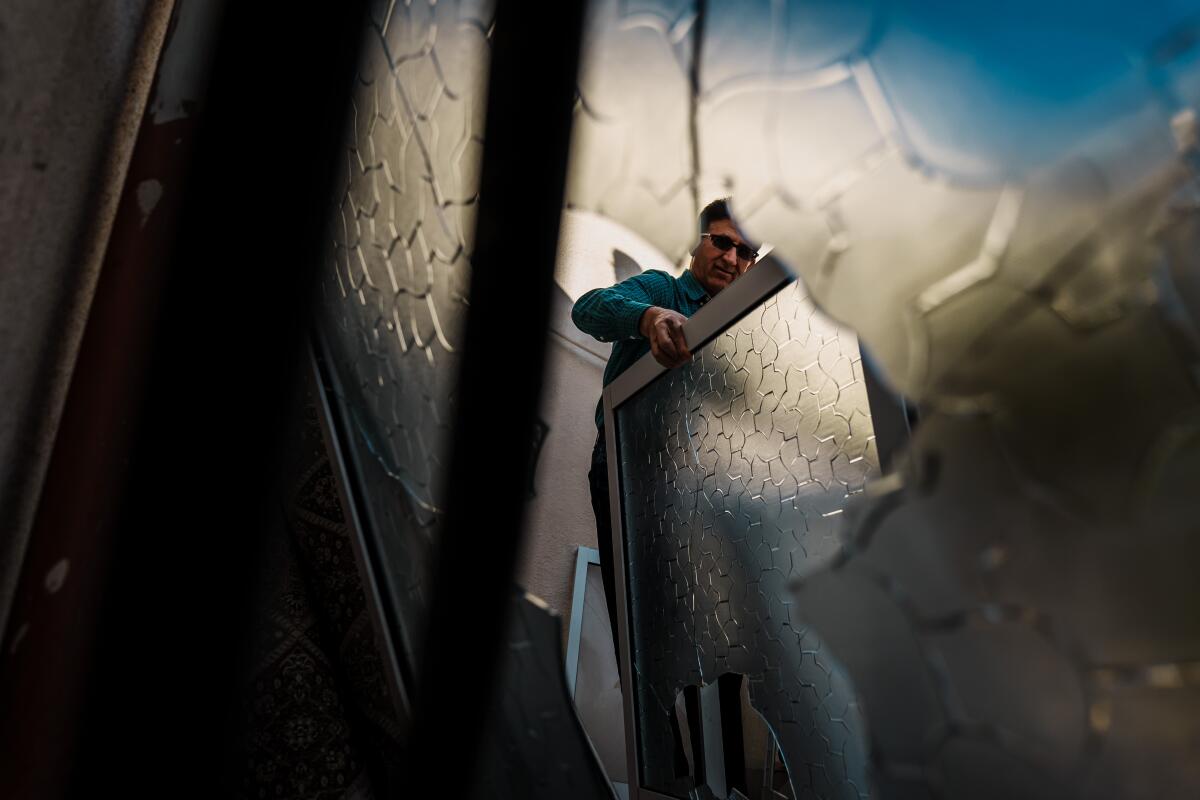
3
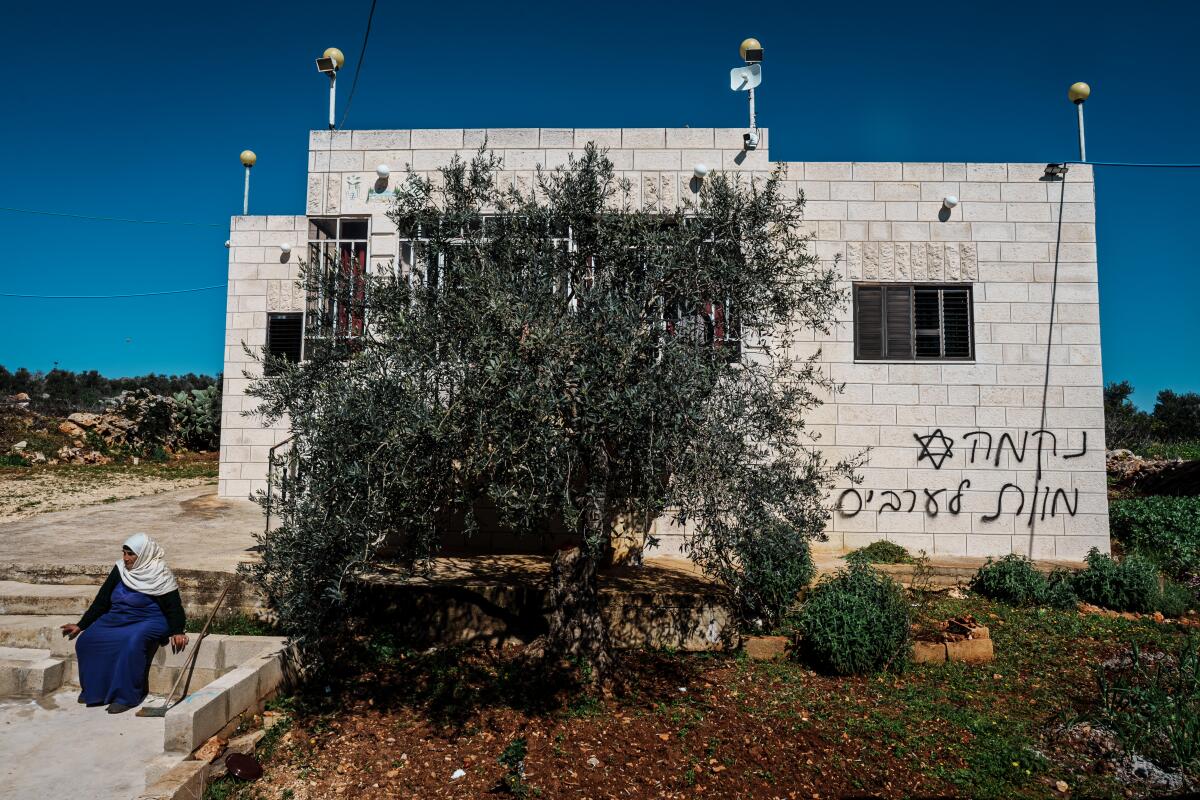
1. Israeli settlers and troops blocked access to two springs Qaryut used for water, as well as most roads out of the Palestinian village. 2. Israeli settlers threw bricks into this Palestinian home outside Qaryut, according to Raed Hajj Muhammad, mayor of nearby Jalood. (Marcus Yam / Los Angeles Times) 3. A spray-painted message on a Palestinian home reads “Death to Arabs” in Hebrew alongside a Star of David. It was reportedly left by Israeli settlers who also burned a vehicle in a rampage in Turmus Ayya. (Marcus Yam / Los Angeles Times)
In an email, an Israeli army spokesperson said: “Throughout the harvest season, the Abu Awad family harvested in their groves, in constant coordination with the security forces.”
Any claims that they were blocked from harvesting “will be examined accordingly,” the email said.
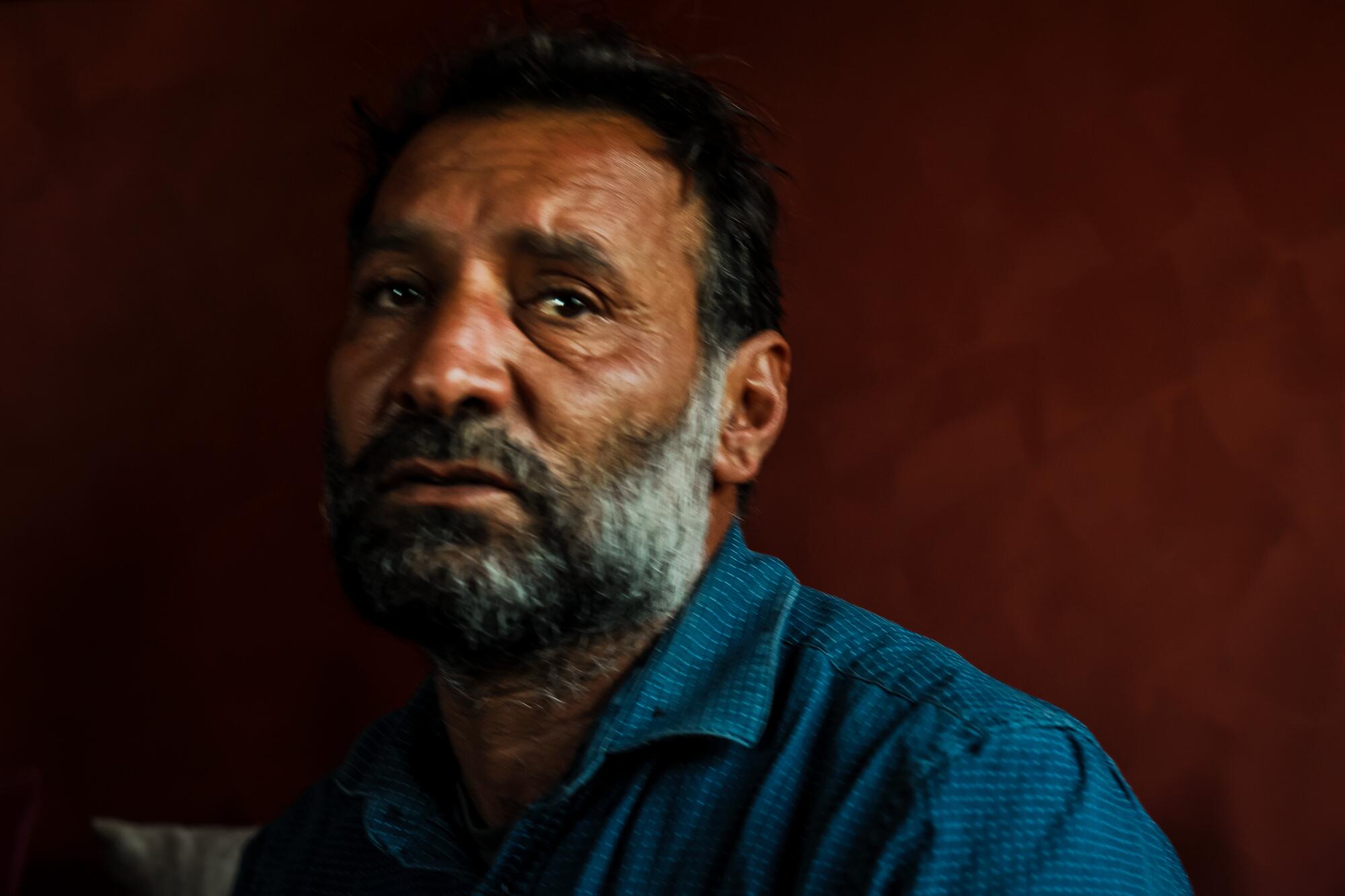
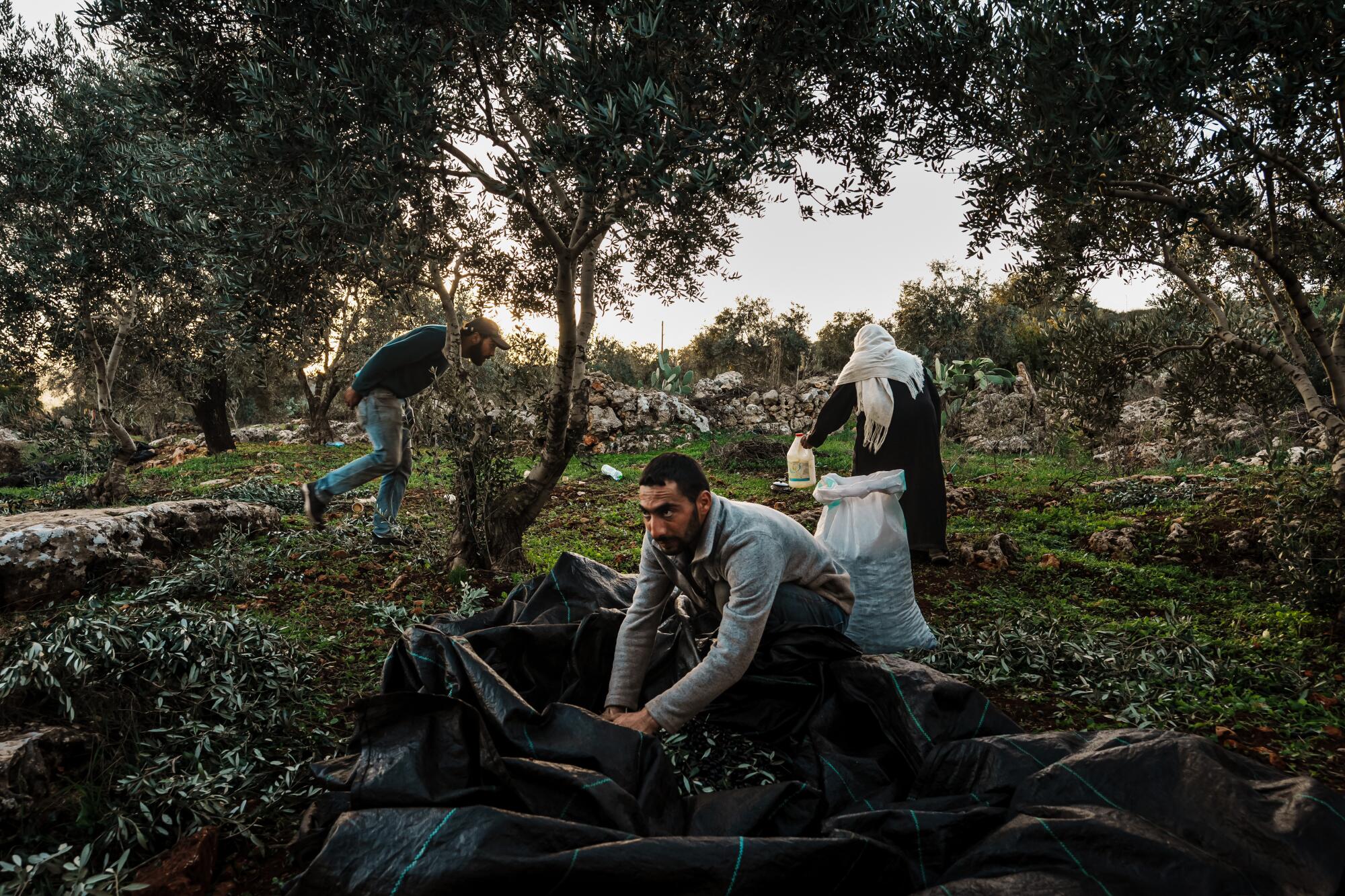
: :
The first attack on Abu Awad came later in December.
In his recounting, more than a dozen men — some in masks — entered his grove and started beating his son Mohammad. They kicked Abu Awad and hit him with rifle butts, he said, and told him that settlers had complained about his olive picking and that he wasn’t allowed to harvest anything.
He said that when his son Judeh intervened, they pushed him to the ground and put a rifle to his head.
The men went through the family’s smartphones, then spilled over their bags of olives and took the empty sacks along with their generator, tarps and all of their harvesting equipment, according to Abu Awad and other family members.
The council representing the settlers of Shiloh said in its statement that the community had nothing to do with any attack on Abu Awad or his family.
The only known confrontation with the family occurred when several boys from the settlement approached their house and then left after a few minutes, the council said, adding that “no violent acts were recorded.”
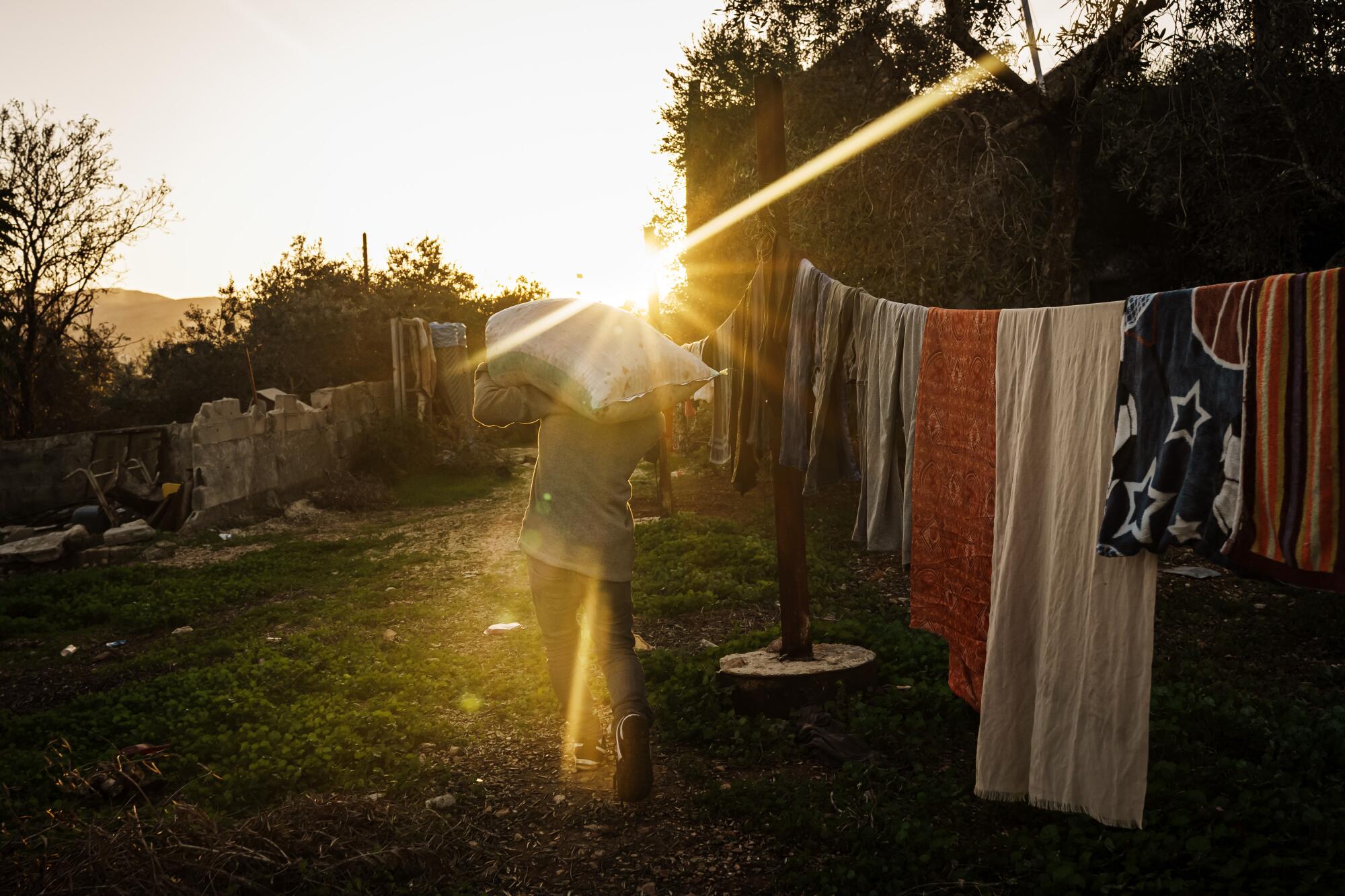
The council said Israeli troops had confiscated equipment from Abu Awad because of violations of security measures. A military spokesman did not answer questions from The Times about the equipment.
Two hours after the attack, Abu Awad sat on a tattered couch outside the building where Judeh lived in Turmus Ayya. His face and his waist were bruised, and he flinched when he moved. He refused medical care, but his sister, who he said had been hit with a rifle butt, was treated at a local clinic.
“Son, I’m begging you — it’s enough what you harvested,” Abu Awad’s mother told him. “There’s no need for more. Why go again?”
Abu Awad shook his head. “I have to harvest them,” he said. “It’s my only income.”
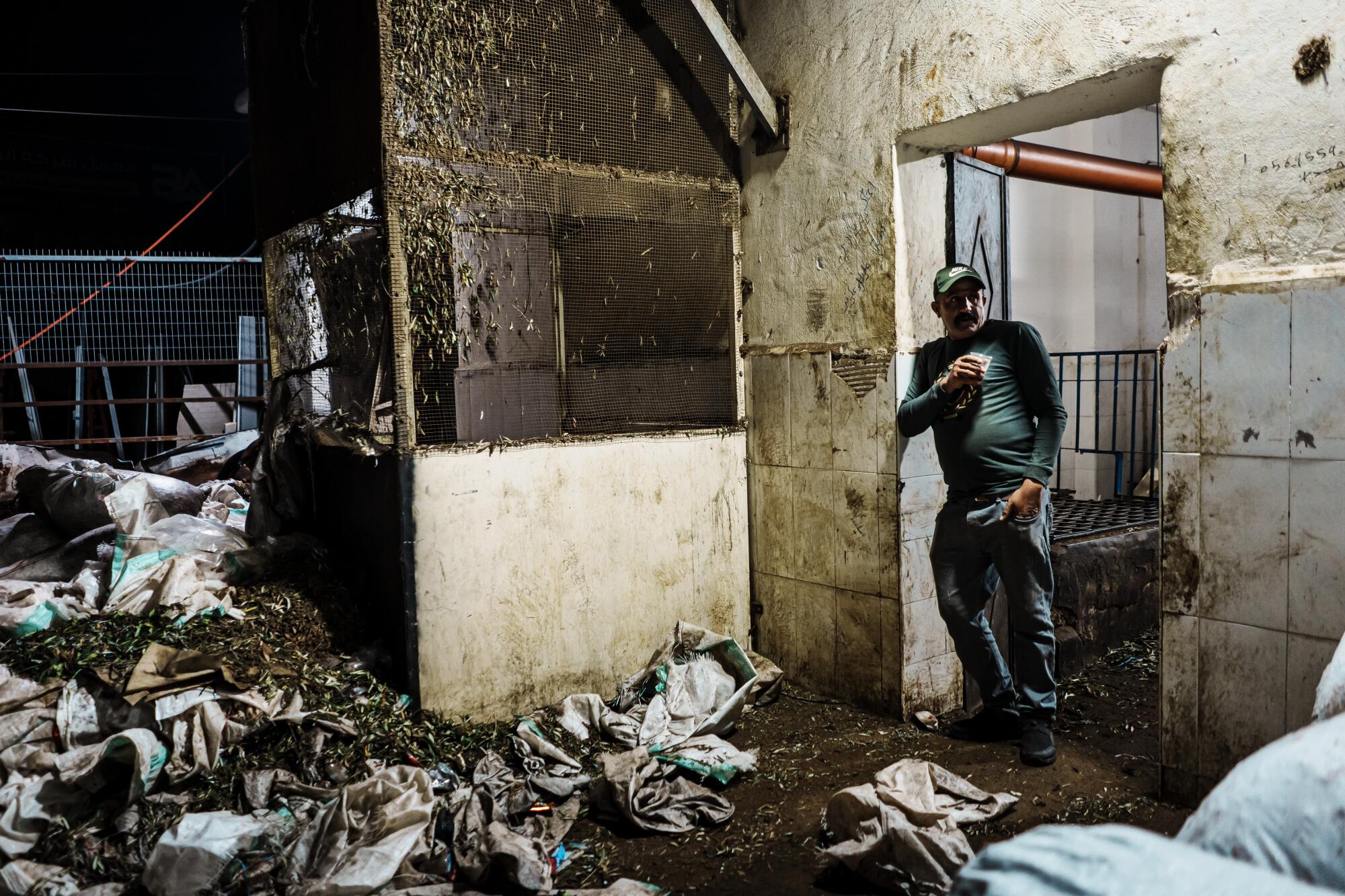
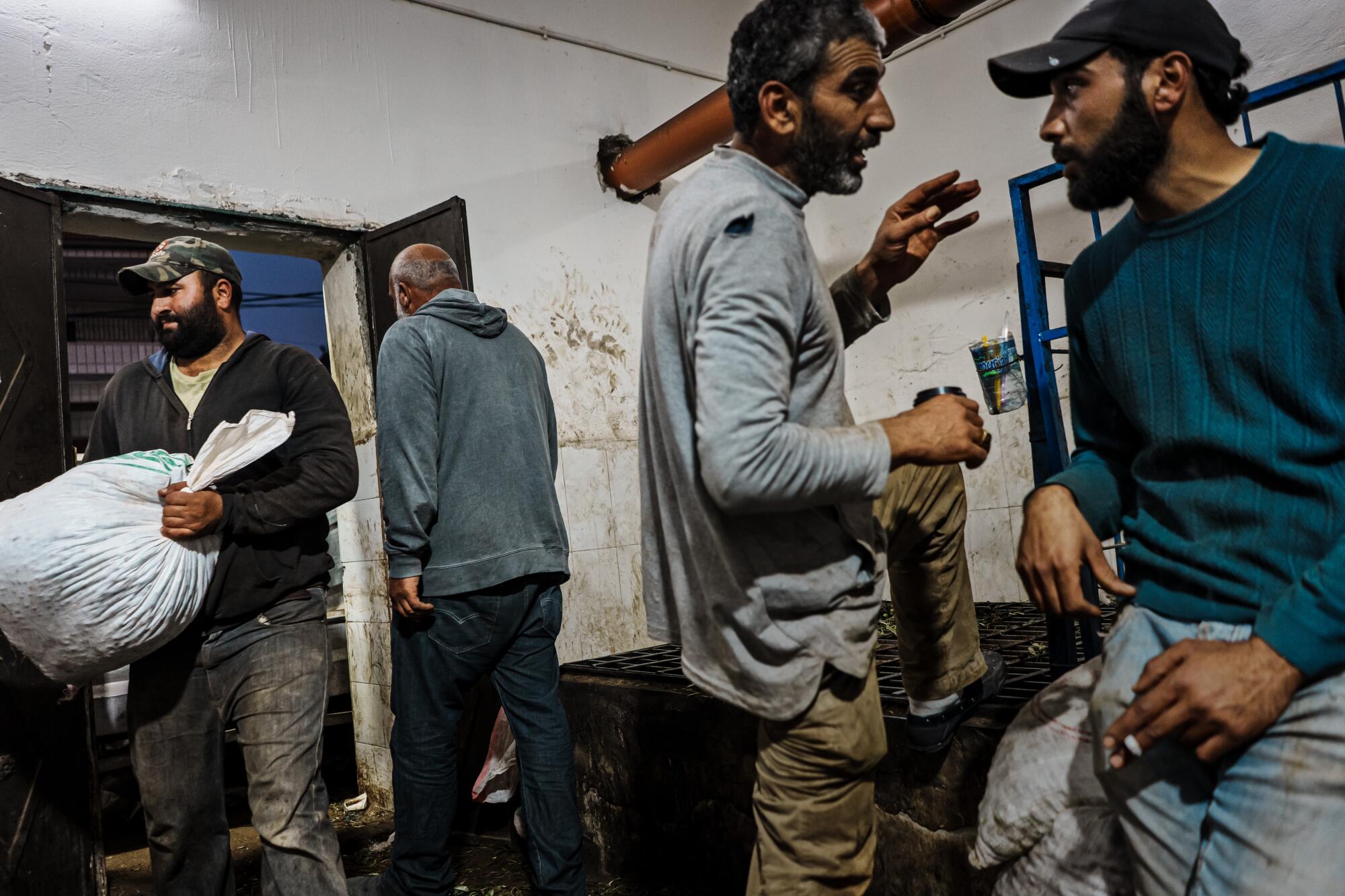
The attack quickly became fodder for a new round of panicked discussions in a WhatsApp group launched more than two years ago in Abu Awad’s community to document conflicts with settlers and help its 348 members navigate checkpoints and avoid confrontations with Israeli forces. Posts on the app had become more frequent since Oct. 7.
The founder of the group was Bashar Maamar, a 31-year-old from the nearby village of Qaryut who volunteers with the Palestine Red Crescent Society and the Israeli human rights group B’Tselem.
Over the years, Maamar has filed hundreds of complaints against settlers. Lately, he was recording between six and seven incidents a day in his notebooks.
On a Friday in late December, he climbed into his car for what has become a weekly exercise: keeping vigil against pre-Sabbath attacks from Shiloh and a nearby settlement named Eli.
He drove to a hill overlooking a spring where a group of settlers had gathered. From the opposite hill, an Israeli soldier trained a sniper rifle in his direction.
Since the war, Maamar said, settlers had closed off three of the four roads into the village of Qaryut and commandeered the two springs it relied on for water. In all, he said, settlers had taken more than 2,000 acres of agricultural land in Qaryut, Turmus Ayya and the neighboring village of Jalud.

In response to questions from The Times, the Israeli army said it would examine cases in which access to a spring was reportedly denied.
The settler council maintained that the springs and other nature areas were “open to all Jewish and Arab residents of the area” but that “Jews are not allowed to visit the open natural sites for fear that they will be attacked.” The council added that “for security reasons and to protect the Jewish population, the army prevents the movement of Arabs at times and places according to its discretion.”
In a statement to The Times, administrators of Eli said Palestinians who took water from the springs were “despicable thieves” who should be “prosecuted immediately.”
Bedouins of the Negev desert face rockets from Gaza and discrimination and arrest by Israel. They seek safety as the war energizes the far right.
Maamar said the complaints he files rarely lead to action.
“We expect nothing from the Israeli legal system,” he said. “They open a case, then it’s closed. Perpetrator unknown, even if we give them pictures.”
He added that if police arrive while settlers are attacking Palestinians, “they end up firing tear gas and rubber bullets on us, not the settlers.”
Asked about Abu Awad and his family, Maamar said: “They’re under siege.”
: :
In mid-January, a few dozen men walked onto Abu Awad’s property at sunset and smashed solar panels, windows, water cisterns and generators, Abu Awad and other family members said. The family believes they came from Shiloh.
Settlers spray-painted graffiti proclaiming “Death to Arabs” on their home in Hebrew while others climbed on the rooftop, bashing it with sledgehammers. Another group hit the door of the house, where Abu Awad’s brother and family were hiding with their 80-year-old father.
The settlers council denied that anyone from Shiloh was involved.
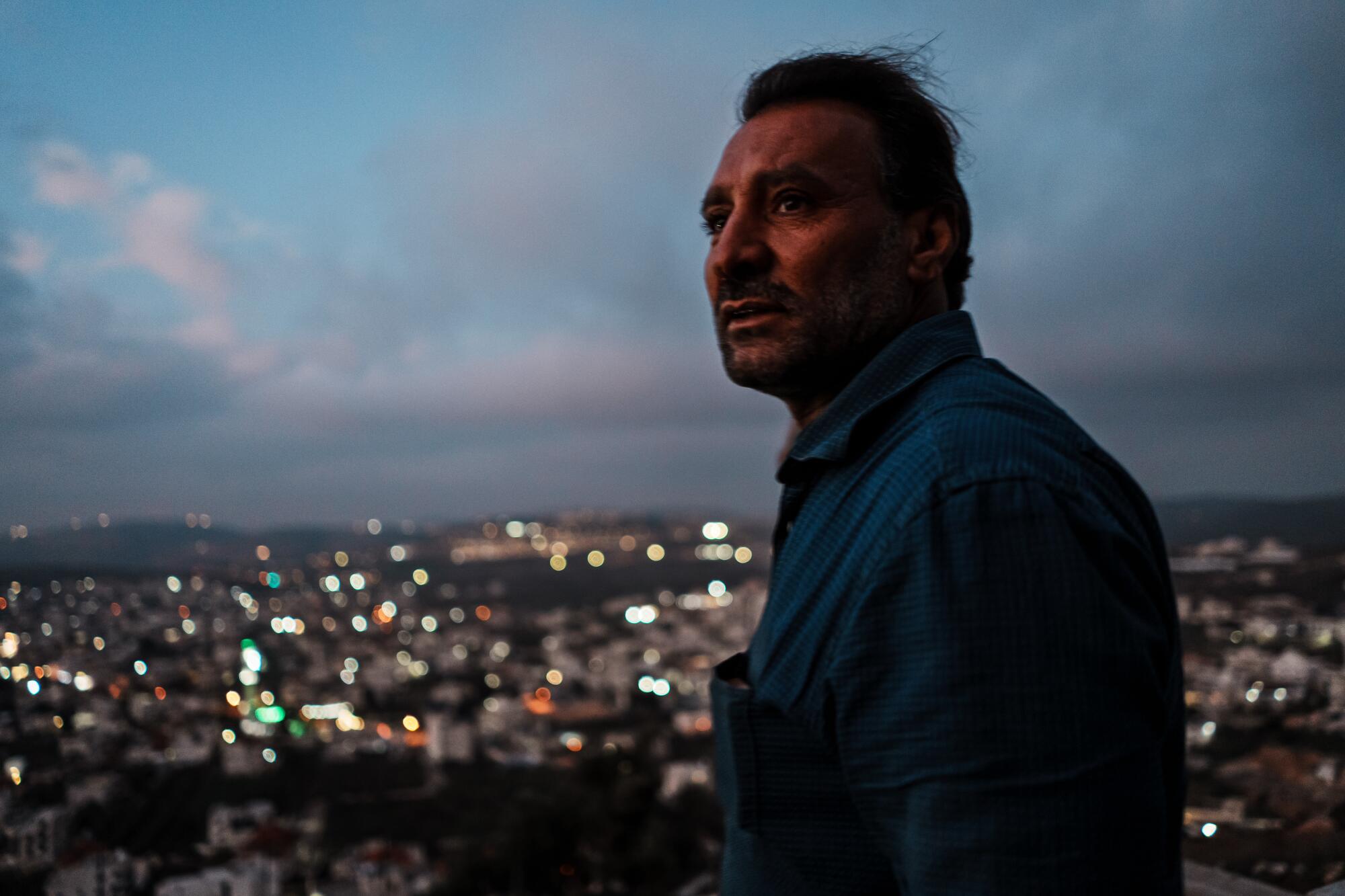
In February, the army churned up the only road by which Abu Awad could get home from the main road, leaving him only a rough dirt trail to access his land.
By then, the olive harvest season was over. It had been a disaster for more than Abu Awad’s family. Almost 96,000 acres of olive groves — about 40% of the West Bank’s total — went unharvested, according to the U.N.
Abbass Melhem, head of the Palestinian Farmers’ Union, estimated that the harvest had brought in $60 million — well below the $160 million the World Bank defines as a “good year.”
Meanwhile, the olive press that serves Turmus Ayya and other villages produced less than a fifth of its normal output, according to B’Tselem, the rights group.
Abu Awad would normally have more than 200 tanks of oil to sell. This year he didn’t even get 20. But no matter what happened, he had no plans to leave.
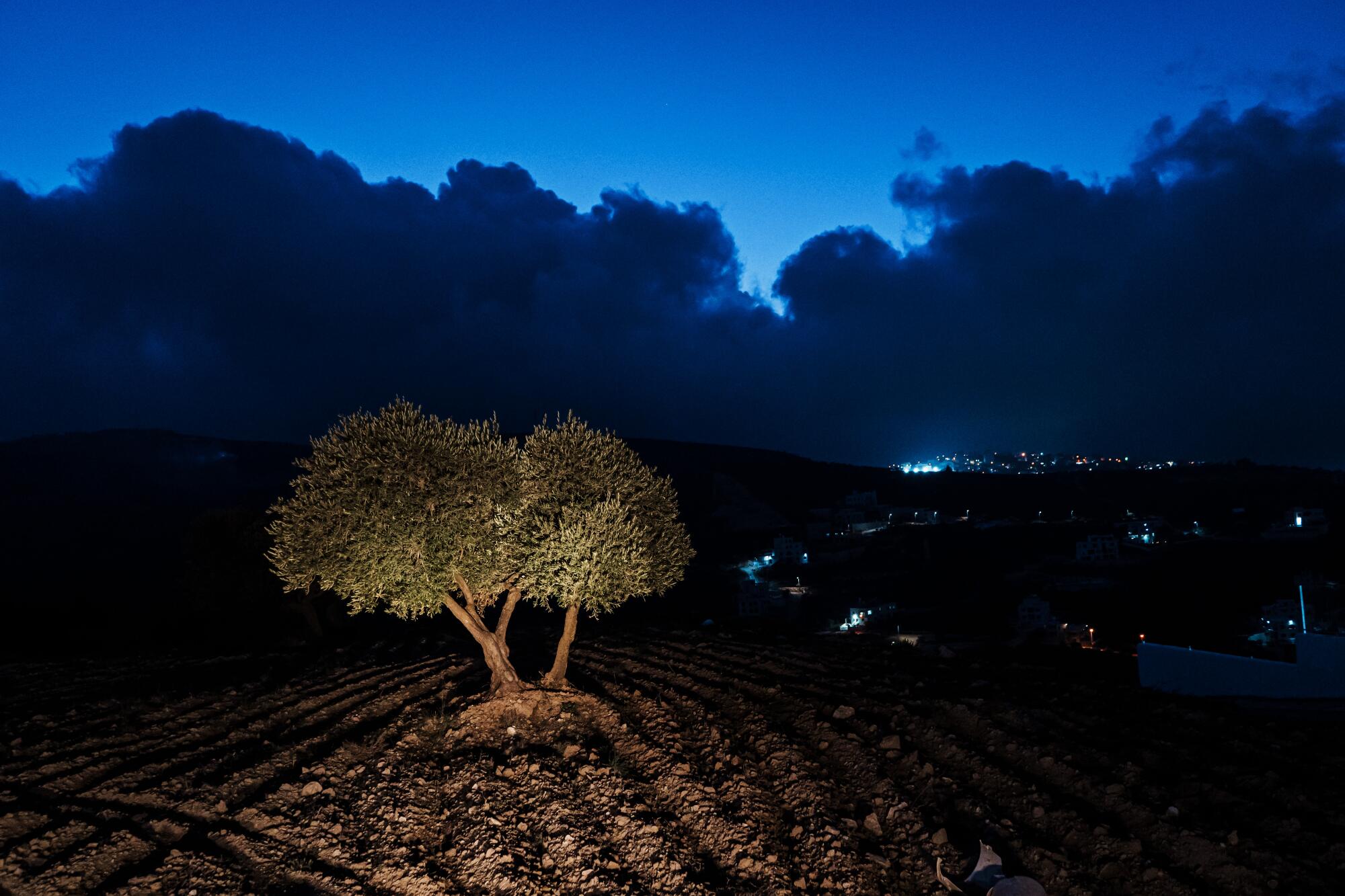
“Today they stop me from picking olives. Tomorrow they’ll tell me I can’t walk around my own home,” he said.
“I’m staying on my land,” he said. “In my house.”
Yam and special correspondent Matan Cohen contributed to this report.
More to Read
Start your day right
Sign up for Essential California for news, features and recommendations from the L.A. Times and beyond in your inbox six days a week.
You may occasionally receive promotional content from the Los Angeles Times.
